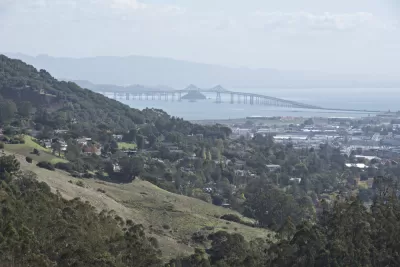Marin County, the wealthy county in the North Bay Area with a history of exclusionary land use and transportation practices, is using the shortage of water to justify blocking the development of an affordable housing project.

"Housing advocates and developers are warily watching California’s intensifying drought and what it may mean in a state that needs millions of new homes to house its residents," reports Emily C. Dooley.
According to Dooley, "the state’s twin issues of housing stock and water availability are colliding." New housing requires more water and puts stress on existing water supplies, which is especially true for the sprawling housing developments that have for decades been the most common form of new housing in the state. At a time when the state is empowering water regulators to divert water supplies, the state needs 120,000 new affordable homes every tear until 2030, according to an estimate by the California Housing Partnership.
Much of the article focuses on the potential consequences of the drought for affordable housing development in Marin County. According to Dooley, the Marin Municipal Water District is considering a moratorium on new water connections after stalling an affordable housing project in the name of water. The decision to stall the water permits for a 74-unit multifamily development approved by the county for low- and extremely low-income residents is also likely to set a precedent for a "healthy aging center" working its way through the permitting process.
Another city, Oakley, in Summit County, Utah, has also taken steps to block development out of concerns about the local water supply, but the Marin County example certainly sets the decision in a different development context. The article invokes the word NIMBY to describe the effect of the drought on housing politics in the state of California. "Housing is needed throughout the state. Where housing opponents usually cite traffic concerns, water concerns could become one more way to thwart development," according to Dooley.
The action by the Marin Municipal Water District to block the construction of affordable housing comes at the same time as governments around the state of California plan to meet the targets for planned housing development according to the mandates of the Regional Housing Needs Assessment process.
FULL STORY: Water and Housing Needs Collide in California’s Severe Drought

Alabama: Trump Terminates Settlements for Black Communities Harmed By Raw Sewage
Trump deemed the landmark civil rights agreement “illegal DEI and environmental justice policy.”

Study: Maui’s Plan to Convert Vacation Rentals to Long-Term Housing Could Cause Nearly $1 Billion Economic Loss
The plan would reduce visitor accommodation by 25% resulting in 1,900 jobs lost.

Why Should We Subsidize Public Transportation?
Many public transit agencies face financial stress due to rising costs, declining fare revenue, and declining subsidies. Transit advocates must provide a strong business case for increasing public transit funding.

Wind Energy on the Rise Despite Federal Policy Reversal
The Trump administration is revoking federal support for renewable energy, but demand for new projects continues unabated.

Passengers Flock to Caltrain After Electrification
The new electric trains are running faster and more reliably, leading to strong ridership growth on the Bay Area rail system.

Texas Churches Rally Behind ‘Yes in God’s Back Yard’ Legislation
Religious leaders want the state to reduce zoning regulations to streamline leasing church-owned land to housing developers.
Urban Design for Planners 1: Software Tools
This six-course series explores essential urban design concepts using open source software and equips planners with the tools they need to participate fully in the urban design process.
Planning for Universal Design
Learn the tools for implementing Universal Design in planning regulations.
Caltrans
Smith Gee Studio
Institute for Housing and Urban Development Studies (IHS)
City of Grandview
Harvard GSD Executive Education
Toledo-Lucas County Plan Commissions
Salt Lake City
NYU Wagner Graduate School of Public Service





























